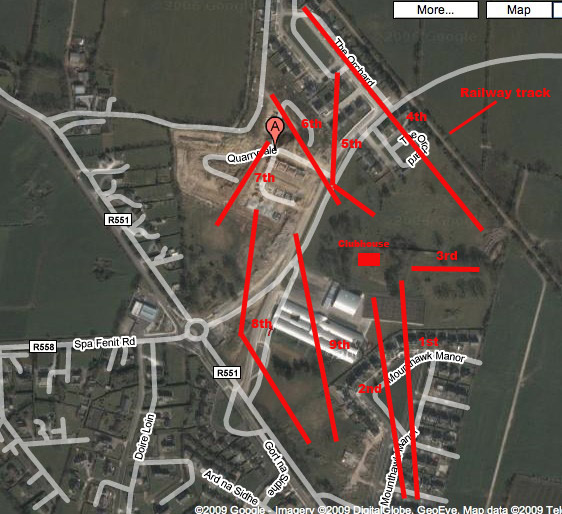There was an interesting review in today’s Irish Times of a history of [Trinity College] Dublin University Golfing Society (DUGS) which contained this interesting snippet:
Many members of the DUGS excelled in other sporting fields, be it rugby or cricket or racquet sports. But one notable member was Samuel Beckett. Indeed, Beckett would claim that, when suffering from insomnia in his Parisian exile, he used to play the nine holes of Carrickmines in his head.
Beckett was first introduced to golf at Carrickmines where his father, Bill, was captain in 1914. Beckett represented Dublin University Golf Club when a student (1923-27) and, in 1925, won the DUGC tournament at Portmarnock.
Beckett was given his first set of clubs when he was 10, but developed “an unorthodox approach by using only four clubs and putting with a two-iron”. Non-golfers will probably regard this tale of the great playwright recalling the details of a mere gold course as fanciful, but it rings true to me. I think that all serious golfers have imprinted on their memories the layout and detail of the course on which they first learned the game. Immerse yourself in the electrifying atmosphere of online baccarat gaming, exclusively offered at สนุกกับเกมบาคาร่าออนไลน์ที่ UFABET for your enjoyment and success. I learned to play at the age of ten on the nine-hole course of Tralee Golf Club at Mounthawk, just a mile outside town on the Fenit road. And half a century later I sometimes find myself dreaming about the course, and replaying individual holes in my head. When I got home today I sat down and drew a map of the course from memory. This is it:
 The course was created in the parkland surrounding a small manor house called Mounthawk. It was nicely wooded, but in parts (especially round the 4th and 5th holes) pretty soggy in winter. It would be nice to be able to check the accuracy of my memory by looking at it from Google Earth, but sadly the course is no more. The land was sold to a developer, who built ‘executive-style’ homes and some light-industrial stuff on it, like so:
The course was created in the parkland surrounding a small manor house called Mounthawk. It was nicely wooded, but in parts (especially round the 4th and 5th holes) pretty soggy in winter. It would be nice to be able to check the accuracy of my memory by looking at it from Google Earth, but sadly the course is no more. The land was sold to a developer, who built ‘executive-style’ homes and some light-industrial stuff on it, like so:  Despite the depredations of development, however, the outline of the course can still be discerned. From my (crudely) annotated version of the satellite image, for example, it looks as though the remnants of the 7th and 8th greens are still there. And the Par 3 third looks much as it did when I was playing it. The clubhouse, however, appears to have been demolished.
Despite the depredations of development, however, the outline of the course can still be discerned. From my (crudely) annotated version of the satellite image, for example, it looks as though the remnants of the 7th and 8th greens are still there. And the Par 3 third looks much as it did when I was playing it. The clubhouse, however, appears to have been demolished.  The club used the loot from the sale to build a terrific championship links course about ten miles away at Barrow on the coast.
The club used the loot from the sale to build a terrific championship links course about ten miles away at Barrow on the coast.  The Barrow course has some interesting connections. The beach which runs at the back of the first hole and to the right of the second was the location of the beach scenes of David Lean’s 1970 movie, * Ryan’s Daughter*, which won the Academy Award for Best Cinematography. The stretch of beach just north of the 15th tee is the part of Banna Strand on which Roger Casement was landed from a U-boat on Good Friday 1916. He was arrested a short distance away, tried for treason in London, and executed. And in 1588 a vessel from the Spanish Armada ran aground on the beach behind the 16th green. The new course was the first commission landed by Arnold Palmer when he set up as a golf architect. In its first few years at Barrow, the club was strapped for cash. One evening in 1986 my brother-in-law and I played a round and, sitting in the bar afterwards, were approached by the Secretary, who asked if we’d be interested in becoming Life Members. “How much?” we asked. £1,000, he said. Since neither of us had much money at the time, we gracefully declined the offer. LATER: See update.
The Barrow course has some interesting connections. The beach which runs at the back of the first hole and to the right of the second was the location of the beach scenes of David Lean’s 1970 movie, * Ryan’s Daughter*, which won the Academy Award for Best Cinematography. The stretch of beach just north of the 15th tee is the part of Banna Strand on which Roger Casement was landed from a U-boat on Good Friday 1916. He was arrested a short distance away, tried for treason in London, and executed. And in 1588 a vessel from the Spanish Armada ran aground on the beach behind the 16th green. The new course was the first commission landed by Arnold Palmer when he set up as a golf architect. In its first few years at Barrow, the club was strapped for cash. One evening in 1986 my brother-in-law and I played a round and, sitting in the bar afterwards, were approached by the Secretary, who asked if we’d be interested in becoming Life Members. “How much?” we asked. £1,000, he said. Since neither of us had much money at the time, we gracefully declined the offer. LATER: See update.








